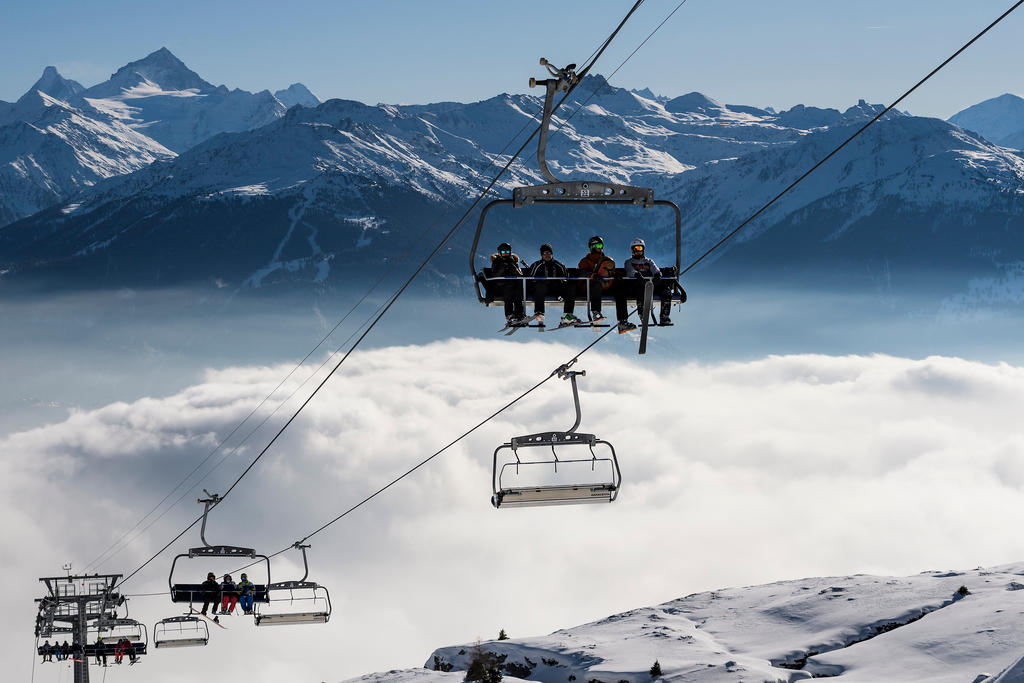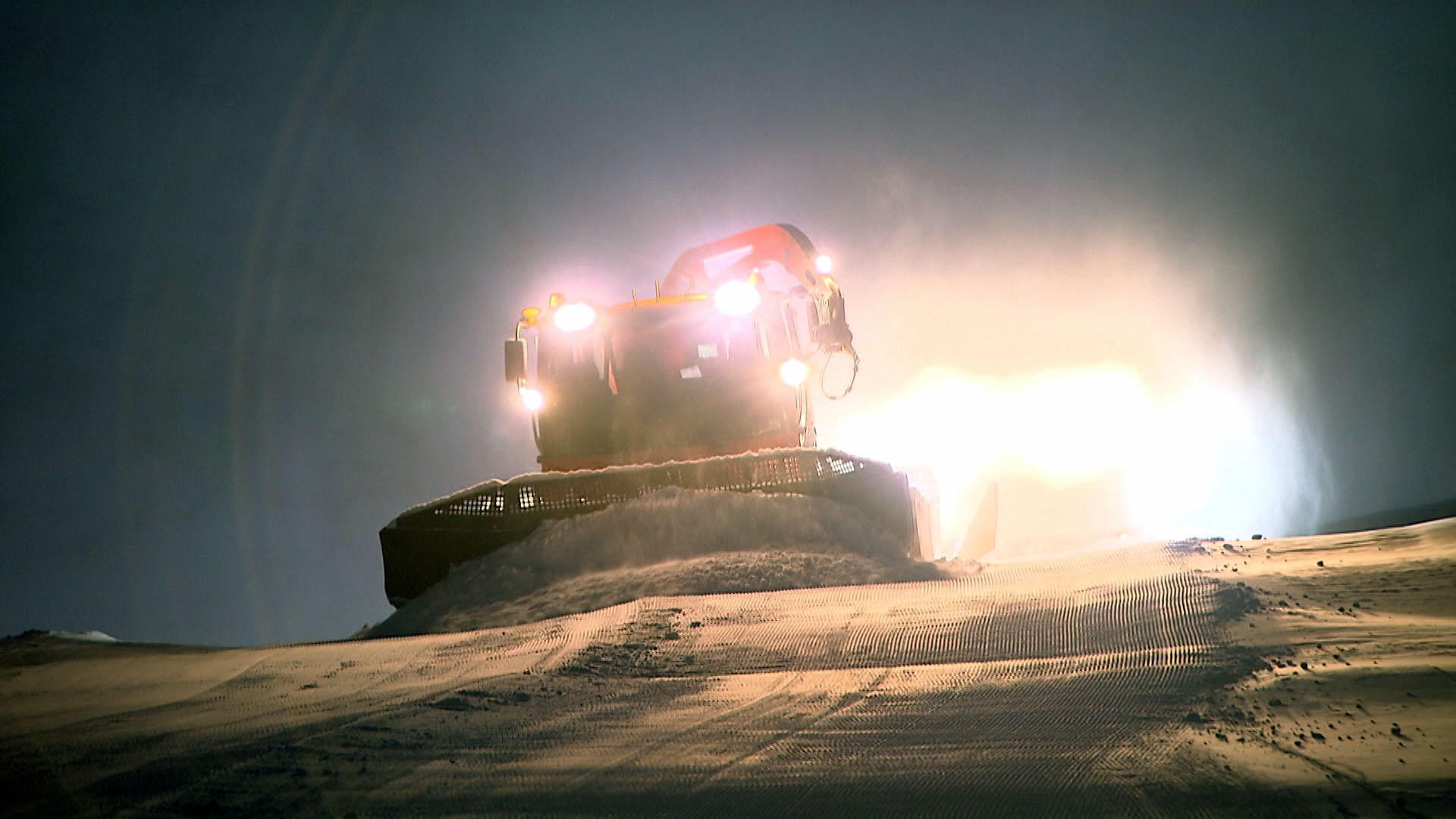
Can low-cost ski passes help lure back visitors?

Swiss resorts are hoping that a combination of heavy discounts on season passes and a weaker franc will bring skiers back to the slopes after a series of poor winters.
For the second year in a row, the high-altitude resort of Saas-Fee is offering an 80% discount by marketing a cut-price crowd-funded season pass (CHF233) aimed at boosting domestic demand; so far it has sold over 77,000 “WinterCard” ticketsExternal link. Last year, the figure was 75,000, which generated a +15% increase in the number of nights people spent there in accommodation.
“The entire valley benefited last year,” declared Claudine Perrothon, in charge of public relations for Saas-Fee. “There was an increase in the number of people skiing, and business for the hotels, apartments and shops.”
Their scheme appears to have inspired others. Right now, everyone is talking about the new single season “Magic Pass”External link, offering 1,000 kilometres of skiing in about two dozen big and small resorts across western Switzerland and parts of the Bernese Alps. It was sold at a huge discount of CHF359 when it was launched in the spring, and when the offer closed the resorts had sold enough passes to account for almost of their average winter turnover.
There are many other deals being pushed to skiers this year, including resorts testing flexibly priced day passes based on demand and weather conditions, and special tickets for families and young people (see infobox below).
The jury is out – until April
Will this avalanche of cut-price initiatives help lure more people to the slopes and create a bigger financial pie for the resorts? Or could more low-cost season tickets simply mean fewer day passes sold? It is still early days, but opinions appear split on the advantages of this type of strategy.
Myriam Scaglione, a professor at the Valais University of Applied Sciences and Arts (HES-SO), said Saas Fee had been innovative and the financial results were positive, without affecting neighbouring resorts.
“But if we copy this cut-price model elsewhere will the effect be the same?” she wrote in the 24Heures newspaper. “We have to wait until the end of the season to start to answer this question,” she said, explaining it was difficult to measure the impact on sales of day or weekly passes.
Geneva-based ski consultant Laurent VanatExternal link, who publishes an annual global report on winter tourism and resorts, was also uncertain about the long-term effect.
“Some people may buy such a pass as it’s cheap and may go skiing five or six times as they’ve calculated that’s the number of visits to be reimbursed. But I also think there’ll be people who’ll buy the pass and only go three times,” he declared.
Peter Furger, a winter sports consultant from canton Valais, was more critical.
“You can’t cut prices by three while the costs for staff and materials keep increasing in Switzerland and expect no consequences,” he told 24Heures. “If you cannot massively increase the number of daily skiers, the hole will be even bigger than last year.”
Over the past nine seasons, the number of winter skier days in Switzerland has fallen steadily from 29.3 million to 21.2 million – the lowest level for over 25 years.
With their aggressive price strategies, ski resorts are hoping to partly reverse this downhill trend, which has been dictated by Switzerland’s slowly ageing population, a plethora of other winter activities, a strong franc and poor snow conditions, among other factors.
At a press event in Zurich in early November, outgoing Switzerland Tourism boss Jürg Schmid tried to sound positive about the upcoming winterExternal link. His optimism is mainly due to the recent fall in the franc against the euro. After two winter seasons with the franc at CHF1.10 or below against the euro, European tourists will now get CHF1.16 francs for every euro.
Schmid argued that with a weaker franc, a day ski pass should now cost European visitors 6.5% less than the previous season. While the number of European holidaymakers is unlikely to return to the peak prior to the euro crisis, the tourism director is confident Switzerland can this winter recover at a good number of those lost.
The Economic Institute (KOF) at the Federal Institute of Technology in Zurich (ETHZ) predicts a 3.6% rise in overnight stays this winter, partly thanks to the weaker franc and the expected return of German, French and Italian tourists – but only if weather and snow conditions are optimal.
However, snow conditions remain unpredictable. The past two winter seasons were poor, with resorts at lower altitude suffering. A study published last year External linkshowed Switzerland now has around 40 fewer snow days a season than in the 1970s at both low and high altitudes. In the same vein, Credit Suisse released a gloomy report this week warning that by 2035 only a third of Swiss alpine resorts will have enough snow in an average winter to offer skiing. Today, about 60% of Switzerland’s nearly 250 ski areas can make that promise.

More
Perfectly prepared pistes: at what cost?
Will visitors return from Austria?
Vanat said there were plenty of “positive signals” for Swiss resorts this year, but he felt Schmid’s predictions were rather optimistic. “A ski pass represents only 12-15% of the total cost of a ski holiday, so a 6% saving “is nothing”, he added.
“In recent seasons, foreign visitors have left Switzerland for resorts in Austria and this trend will come to an end at some point, it’s not elastic. But will they come back?” pondered Vanat.
“That’s the difficult question as the offer in Austria is very good. They now have lots of inter-connected resorts and the lifts are good. What matters more is accommodation and I think many Austrian resorts offer a much better price-quality ratio than in Swiss ski resorts.”
He says the main challenges for the Swiss winter tourism industry are two-fold.
“I think it’s partly about demographics but it’s also about convenience. Skiing is competing with lots of other activities and most of them are more convenient than skiing. But I think the good news is that there is much room to improve the skiing experience,” he said.
As well as offering better accommodation, Vanat believes resorts could introduce small changes that ‘make a big difference’, such as centralising the sale of tickets and services, delivering rental skis to apartments and chalets, or installing ski and boot locker rooms near the ski lifts.
“Here in some resorts if you want to rent skis you go to one place, if you want to buy a ski pass you have to go somewhere else and if you want to book ski lessons it’s another place. Sometimes, the car park is not next door. That can mean you have to go to five different places. If you are alone it’s fine, but if you have 2-3 small children, it’s a nightmare,” he declared.
Saas-Fee WinterCard: season ticketExternal link for CHF233, valid in Saas-Fee, Saas-Almagell, Saas-Grund and Saas-Balen. Offer available until 17 December.
Magic Pass:season ticketExternal link for 25 ski resorts (including Château d’Oex, Leysin, Les Diablerets, Villars-Gryon, Ovronnaz, Crans-Montana, Vercorin, Grimentz-Zinal). April launch price: CHF359 or CHF 249 (children). Offer ended on 13 November.
Mont4Card: under-25 year olds pay CHF400 francs instead of CHF1,402 for annual Four Valleys season ticketExternal link. Offer ended November 30.
Bad Ragaz/Wangs: depending on the weather forecast, there is a discount of up to 50% on day passes in the Pizol ski areaExternal link: The worse the SRF weather forecast, the cheaper the day ticket.
Bernese Oberland: Top4 season ticketExternal link for 666 km of slopes costing CHF 666 (adults), CHF499 (youth) and CHF333 (children). Valid in the ski regions Adelboden-Lenk, Gstaad, Jungfrau ski region and Meiringen-Hasliberg. Offer until December 15.
Andermatt/Sedrun: together with Ticketcorner, the Andermatt Sedrun ski arenaExternal link is introducing flexible prices for day passes. The price of the pass depends on the season, day of the week, booking date and weather.
Portes du Soleil: Border Pass season ticketExternal link for the entire Portes du Soleil ski area cost CHF400 for children and young people up to 26.

In compliance with the JTI standards
More: SWI swissinfo.ch certified by the Journalism Trust Initiative






























You can find an overview of ongoing debates with our journalists here . Please join us!
If you want to start a conversation about a topic raised in this article or want to report factual errors, email us at english@swissinfo.ch.